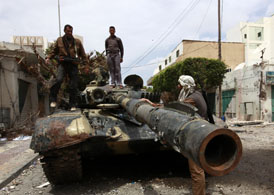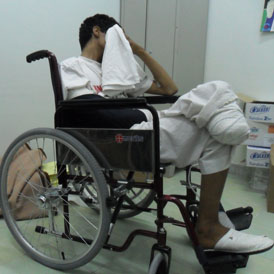Child soldiers sent by Gaddafi to fight Libyan rebels
A 16-year-old boy tells reporter Ruth Sherlock how Gaddafi loyalists forced him and other youths to fight the rebels on the front line of Misrata’s bitter siege.

Sixteen-year-old Murad, banters with his doctors from his oversized wheelchair.
Smooth faced and wide eyed, with a big innocent smile, he talks about football, computers, and blushes at the mention of girls.
Murad is still too young to shave, but until last week he was handling weapons on the deadliest front of Libya’s brutal civil war. Until he was injured, and captured by the opposition, Murad was an unwilling soldier in Colonel Muammer Gaddafi’s conscript army.
Now his arm is in plaster, and the white bed sheet draped over his thin frame covers the bloody, bandaged stump where his leg has been amputated.
Murad is one of an ‘army’ of child soldiers being used by Colonel Muammer Gaddafi in the battle to regain the besieged Libyan town of Misrata. School boys as young as 15 are being conscripted to the front line say government troops captured by the rebels.
Dozens of school boys who have been taken from Tripoli, and forced to fight for Gaddafi say eyewitnesses.

Ninety boys, between the ages of 15 and 19, where called to military barracks in Tripoli “for training” as soon as the 17th February popular uprising began, Murad, and another captive have independently said.
“Many of the people there are younger than me,” says Murad. Murad is pictured left, but was too scared to show his face.
“We were kept locked in the camp and trained a little and then they took us to the battalion,” says ‘Abdul’ who is based different clinic.
The nineteen year old wounded soldier is too frightened to be fully named.
For nearly six weeks they were kept without access to radio or television. Then with no information about where they were going, the group was then taken to Misrata.
“I didn’t say goodbye to my family when I went to the barracks. I thought I was just going got for two weeks training,” says Murad.
With almost no military training, the boys were handed Kalashnikovs and brought near to the ‘heavy road’ to the sea port- the war zone of artillery, grad rockets and tank fire.
They were told they had to save Misrata from foreign invaders that had taken control of the town. “We were told there were mercenaries close to the sea port” says Abdul.
The boys waited for several days in the abandoned homes of Misrata civilians.
Terrified, Murad’s group refused the officer’s order for them to go forward. They stayed hiding in the home. “The officer found us and forced us into the car” says Murad.
Roughly shoved out of the vehicle at the front line, the bewildered boys came under immediate fire from the rebel troops. Their group was pounded with anti-aircraft fire and heavy machine guns. “Three of the boys died, and the officer ran away,” says Murad.
Abandoned and hit in the leg, Murad tried to stem the blood loss with a tourniquet and dragged himself behind a concrete block. A “rebel saw me and shot me in the arm”.
Rebels took him to a Misrata hospital, but the leg was too damaged to save.
'Children raped in front of families'
Families who fled the some of the bitterest fighting in Libya have told Save the Children that children as young as eight, have been sexually assaulted in front of family members.
One group of mothers said girls had been held for four days and raped, after which they have been unable to speak. Other children said they saw their fathers killed before them and their mothers raped.
Michael Mahrt, Save the Children's Child Protection Advisor, said: "The reports of sexual violence against children are unconfirmed but they are consistent and were repeated across the four camps we visited.
"Children told us they have witnessed horrendous scenes. Some said they saw their fathers murdered and mothers raped. They described things happening to other children but they may have actually happened to them and they are just too upset to talk about it - it's a typical coping mechanism used by children who have suffered such abuse.
"What is most worrying is that we have only been able to speak to a limited number of children - what else is happening to those who are trapped in Misrata and other parts of the country who do not have a voice?"
Save the Children is calling for the international community to ensure that all parties respect children's right to be protected from violence and abuse. The charity is urgently scaling up its child protection work in Benghazi including training social workers to provide children with psycho-social support.
Save the Children: Libya crisis appeal
The doctors recount numerous incidents of young Gaddafi soldiers being brought into the wards. The director of Higma medical center shows video of a young looking boy, clad in khaki green moaning on a stretcher, bloody bullet wounds riddle his body.
“This boy is 16-years-old, we tried to save him, but his injuries were too bad. He died later that day”.
Doctors and rebel fighters say many of the Gaddafi soldiers are shot by their own officers if they are injured or deserting.
The nineteen year old fighter is kept in a locked room of the medical clinic because medics say they are concerned he will be attacked by Gaddafi loyalists. “We have compelling evidence that Gaddafi troops may try to kill captives” says Dr Khalid Abu Falgha.
Abdul went to the front line in a group of 15 young soldiers. When they came under heavy fire from the rebels, the officer turned and ran. He followed, and his own brigade shot him he says.
“The instructions were that nobody should go back. I lay on the ground bleeding for one and half hours. Murad and Abdul live under the sympathetic protection of the rebels.
The youth cannot leave the besieged city for their own safety. “I haven’t seen my family in more than a month,” says Abdul breaking down into tears.
“We have promised Murad that as soon as we can get access, we will personally take him to his father and mother in Tripoli,” says his doctor. “He is just a child”.
Ruth Sherlock is a freelance reporter on the Middle East.
-
Latest news
-
‘Russian aggressions have never pushed Georgia to deviate from its own path’, says Georgian President5m

-
Why is Georgia’s ruling party so intent on adopting ‘foreign influence’ bill?5m

-
Trump’s lawyers try to paint Michael Cohen as liar out for revenge at trial3m

-
England’s schools told not teach gender identity2m

-
Slovakia PM shooting: Suspect charged with attempted murder3m

-





